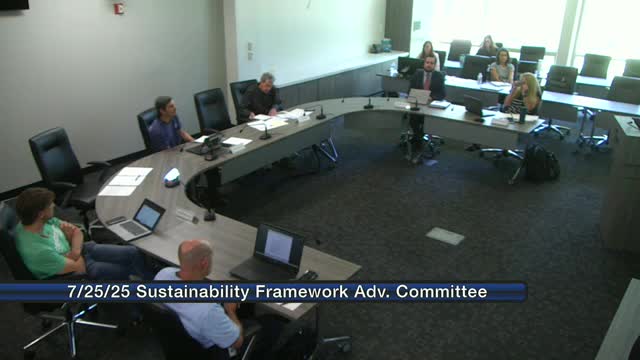Caitlin Davis presents GreenSense program results showcasing significant energy reductions
July 25, 2025 | Denton City, Denton County, Texas
This article was created by AI summarizing key points discussed. AI makes mistakes, so for full details and context, please refer to the video of the full meeting. Please report any errors so we can fix them. Report an error »

The Denton Sustainability Framework Advisory Committee convened on July 25, 2025, to discuss the GreenSense Energy Efficiency Incentive Program's results for fiscal years 2023 and 2024. The meeting featured a presentation by Caitlin Davis, a coordinator in the Environmental Services and Sustainability Division, marking her first presentation to the committee.
Davis began by providing background on the GreenSense program, which was initiated in February 2009 to promote energy efficiency in existing housing. The program focuses on improving building envelopes and systems, such as windows and HVAC systems. Notably, the budget for the program increased from $250,000 to $1 million for the 2023-2024 fiscal year, allowing for enhanced incentive levels aimed at reducing energy consumption.
The presentation highlighted a significant 118% increase in rebates awarded between fiscal years 2023 and 2024, attributed to the increased funding, revised incentive levels, and improved outreach efforts. New offerings included HVAC tune-up rebates and weatherization kits, specifically targeting renters, who were previously underserved by the program.
Davis shared data indicating that HVAC rebates constituted 37% of total rebates awarded, while insulation and window rebates accounted for 6% and 8%, respectively. The average cost covered by rebates nearly tripled, reaching 10.668% of installation costs, reflecting the program's adjustments to better serve residents.
The committee discussed the importance of tracking the effectiveness of these rebates, particularly in relation to installation costs and energy savings. Davis reported that the program resulted in a reduction of 776,388 kilowatt-hours, equating to a decrease of 444 metric tons of carbon dioxide emissions—comparable to the emissions from nearly 50,000 gallons of gasoline.
Looking ahead, the committee emphasized the need for ongoing budget discussions with the city council and continued improvements in data tracking and reporting. The meeting concluded with positive remarks about the program's success and its contribution to Denton's sustainability goals, particularly the aim of achieving net-zero emissions by 2050.
Davis began by providing background on the GreenSense program, which was initiated in February 2009 to promote energy efficiency in existing housing. The program focuses on improving building envelopes and systems, such as windows and HVAC systems. Notably, the budget for the program increased from $250,000 to $1 million for the 2023-2024 fiscal year, allowing for enhanced incentive levels aimed at reducing energy consumption.
The presentation highlighted a significant 118% increase in rebates awarded between fiscal years 2023 and 2024, attributed to the increased funding, revised incentive levels, and improved outreach efforts. New offerings included HVAC tune-up rebates and weatherization kits, specifically targeting renters, who were previously underserved by the program.
Davis shared data indicating that HVAC rebates constituted 37% of total rebates awarded, while insulation and window rebates accounted for 6% and 8%, respectively. The average cost covered by rebates nearly tripled, reaching 10.668% of installation costs, reflecting the program's adjustments to better serve residents.
The committee discussed the importance of tracking the effectiveness of these rebates, particularly in relation to installation costs and energy savings. Davis reported that the program resulted in a reduction of 776,388 kilowatt-hours, equating to a decrease of 444 metric tons of carbon dioxide emissions—comparable to the emissions from nearly 50,000 gallons of gasoline.
Looking ahead, the committee emphasized the need for ongoing budget discussions with the city council and continued improvements in data tracking and reporting. The meeting concluded with positive remarks about the program's success and its contribution to Denton's sustainability goals, particularly the aim of achieving net-zero emissions by 2050.
View full meeting
This article is based on a recent meeting—watch the full video and explore the complete transcript for deeper insights into the discussion.
View full meeting
